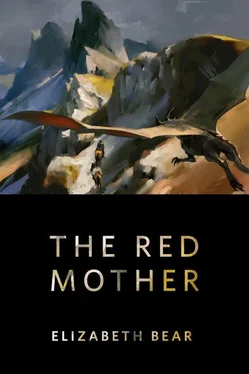Elizabeth Bear
THE RED MOTHER
A pall of ash turned my red horse roan as he and I ambled between tuffs of old lava. Basalt fields spread on either side, dotted with burnt-orange or gray-green lichen. Flat flakes of ash drifted past the brim of my hat.
We were crossing a big flow near the Ormsfjoll, and the reek of sulfur in the air left both Magni and me over-eager to complete our trip. It couldn’t be too much farther to the village. Magni’s ears were pricked. His walk tended to rush into a tolt. I knew he had scented or heard other livestock that was still too far away for me to detect.
He knew that where there was livestock, there was fodder. He was thinking of grain and grass and company, and I couldn’t blame him. It had been a long ride, and a lone horse is never comfortable. They’re meant to be in the company of their own kind.
Some would snipe that this makes my horse the opposite of me.
Fair enough. I felt no need for company. I did need supplies, however, and—if it were to be had—information to complete my quest.
My journey was for kin-duty. I had an obligation to find my brother and give him the news that his name was cleared, his honor restored, and his exile ended. To that end, I had spun the threads of his fate by sorcery, and was following them.
This was where they led.
* * *
The first sign of my return to civilization was a graveyard. The road passed through it, flanked on both sides by neat cairns. Some were marked with runestones; some stood uncommemorated. The lichen had grown over a few. But lichen grows slowly and most of the graves stood barren, sad heaps of brown-black rock with the sea in the distance behind.
Not long after, I came within sight of the village.
It wasn’t a big village, Ormsfjolltharp, and I was in among it almost as soon as I noticed it. Men and women working outdoors turned to watch me as I rode past the two dozen or so houses. Turf houses, some with goats or sheep grazing on roofs that looked more like low hillocks than dwelling-places. I had been corrupted by too much time spent in southern lands where exotic building materials like wood existed. Any trees that grew here would be for boats and bows and axe-hafts, not for houses.
A group of men stood around an open-fronted cattle shed not too far from the well, the baker and the blacksmith. They were doing what folk generally do in such circumstances: passing the time of day and pretending to work a little, in case their wives should check on them.
I fingered the ebony and bone spindle in my coat pocket. The thread on it was wound tight, and I was almost to the end of the roving. I’d followed the thread all the way here, woven my path along Arnulfr’s fate-thread. I’d soon need a new thread to follow. It would raise questions for a solitary man to buy carded wool in such a place, however.
I rode Magni to the hitching rail—not too far from the cluster of gossipers, but not too close either. There were five men: one black, one red, one dun, and two as nondescript in color as I had been before my hair and beard went to pewter.
They looked up as I swung down from the saddle. Magni stood placidly except for turning his head to glance over his shoulder, hopeful of a treat. He got a scratch instead and sighed in companionable disappointment when I didn’t loosen his girth. You never know when you might need to leave in a hurry.
“I know,” I said under my breath. “I’m a grave disappointment to you.”
I seemed to be a grave disappointment to the cattle-shed malingerers as well, judging by the scowls they turned on me. I forced my own face into a friendlier expression than I was feeling, stopped a healthy few paces back, and said, “I’m looking for a man called Arnulfr Augusson. Or his wife, Bryngerthr Thorrsdaughter. It’s possible they passed this way.”
“Be you a kinsman?” the black-haired one asked. His cheeks were suncreased above a thicket of beard.
I nodded. That sharpened their gazes.
One of the nondescript ones asked, “Would that make you the one they call Hacksilver?”
I tipped my head to let the question slide off one side. A weight shifted along the broad brim of my hat, but it was just all the ash piled there. We go viking or we starve; we send our sons off to settle the coasts and rivers of Avalon and the Moonwise Isles; we build our trade towns and send our mercenary bands almost to the heart of the Steppe. And still there aren’t so many Northfolk that a man can escape his reputation—or a lawsuit—with ease.
“Some sort of sorcerer, I heard,” said the black one.
“Right,” said the red. “They say he laid warfetter on a whole castle full of sentries. A double dozen of them, out in Avalon. Across the poisoned sea.”
“Little renown to be won in such work,” I remarked, conversationally. “Who’d sing a man’s name for butchering the blinded and limb-bound?”
“Womanish work, spell-weaving,” said the black-haired man. “Don’t they usually keep camp whores for that?”
He watched me with narrowed eyes.
I made myself sound as if I were not disagreeing. “A curious tale. From whom did you hear it?”
My voice gets a little more precise when I’m being Not Angry. I pulled my hand out of my pocket so I wouldn’t finger my spindle, and I didn’t place it on the hilt of my knife.
“There’s an old Viking up the cinder trail,” the red man said. “A Karlson. Supposed to have been a sea-king in his youth. Nobody here calls him nought but Half-Hand.”
A chill lifted the hairs on my neck. Behind me, Magni snorted and shifted, making the saddle creak. I knew a man with half a hand once, a man whose father’s name was Karl. A Viking, a sea-king, a giver of arm-rings. Yes, he had been those things.
I said, “I never heard of a sorcerer who could lay warfetter on as much as a hand of men all at once. The strain of more would kill the wizard… so they say.”
* * *
The skalds and the seers tell us we ought to love war. And somebody must. There’s enough of it.
Maybe Ragnar Karlson, called Half-Hand, called Wound-Rain, was still that man. Men get old—even sea-kings—and I hadn’t seen him in ten years or more. So I couldn’t be sure. He certainly wasn’t a skald, or a seer.
I might have passed for a seer, but as for the man who loves war… I didn’t think that was me. I was the man who didn’t know what else to do with himself if he wasn’t fighting a war that he hated.
Farming’s harder work and at least as uncertain as raiding. Because the world is not a fair place, farming doesn’t win renown. Extorting towns and ransoming priestlings and chieftains, that is where the glory lies.
Magni was less than pleased with me when I dusted the ash off his saddle and climbed back on. He’d hoped our walking was over for the day, and there might be hot mash and cool water before long. But after a longing look and a little drunken swerve toward a paddock across the square populated by a half dozen other horses, he cooperated.
Ragnar’s homestead was not too much farther. We crossed another finger of the basalt flow and came down into a second grassy valley. From experience, I knew that turf lay over soil no more than a fingerlength deep, comprised of dust, sand, and loess that had collected in this valley that was little more than a crevice between tuffs. Ragnar would have worked himself and his thralls hard to enrich it with dung and fish guts and make it bear the rich green grass that now poked forlornly through drifts of ash.
Читать дальше













